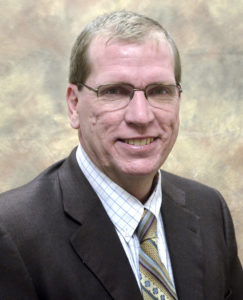Auvermann tapped to weigh in on national clean air standards review
WASHINGTON – Texas A&M’s Brent Auvermann, Ph.D., was selected to serve as a non-member consultant to assist the Chartered Clean Air Scientific Advisory Committee, CASAC, with their review of the National Ambient Air Quality Standards for particulate matter, PM, and ozone.

U.S. Environmental Protection Agency, EPA, administrator Andrew Wheeler announced the appointment of subject matter experts to support the Chartered CASAC efforts recently.
Twelve consultants from nine states were selected from the nominations provided by the public’s response to a Federal Register Notice soliciting nominations.
Auvermann, center director at the Texas A&M AgriLife Research and Extension Center in Amarillo, is a professor in Texas A&M University’s Department of Biological and Agricultural Engineering.
Consulting duties
The role of non-member consultants is to respond to specific written scientific and technical questions from CASAC members related to their area of expertise.
“EPA has national air quality standards, and we have played a role in their air quality monitoring network for 15 years here at our Amarillo center,” Auvermann said.
The National Ambient Air Quality Standards, or NAAQS, are up for review and revision.
“Neither I nor any of the consultants will do the review or make recommendations to the review board,” Auvermann explained. “I will be asked to respond to technical questions of CASAC as they do the review.”
He said urban and rural air quality and the PM that goes with them are two very different things.
“It’s conceivable CASAC will want me to evaluate claims about air quality in which the distinction between urban and rural particulate matter might be relevant,” Auvermann said.
In all likelihood, he said, he will use data from other researchers to inform his answers to questions that arise, and not his research data specifically.
Experience and background
“I am delighted that the EPA reached out and selected Dr. Auvermann, a leading and expert AgriLife scientist, to serve as a consultant to the Clean Air Scientific Advisory Committee,” said Patrick Stover, Ph.D., director of AgriLife Research and vice chancellor and dean for the College of Agriculture and Life Sciences.
“Dr. Auvermann brings rigorous science and real-world experiences to the air quality discussion, and it is important that Texas be represented at that table,” Stover said. “I commend him on this well-deserved honor.”
Auvermann is nationally and internationally recognized as an expert in environmental systems engineering applied to concentrated animal feeding operations. He has published research on air pollution emissions and abatement, nutrient management, evaluating biofuel feedstocks, carcass disposal and agricultural water use.
Earning his bachelor’s and master’s degrees from Texas A&M and his doctorate at Colorado State University in Fort Collins, Colorado, Auvermann joined the AgriLife faculty in Amarillo in 1995. He initially had a dual appointment in the Texas A&M AgriLife Extension Service and Texas A&M AgriLife Research.
Since 2002, a primary focus of his research has been continuous monitoring of cattle feedlot dust. He has collected one of the world’s largest data repositories from in-field continuous monitoring of dust from commercial cattle feedlots.
Auvermann speaks at conferences throughout North America. He also serves as a research partner with faculty/scientists in Texas, Kansas, Idaho, Arizona, Washington, Nebraska, Arkansas, Colorado, California, Michigan, New Mexico and Alberta, Canada.
Lending expertise
Auvermann has served on the national Extension team since 2008. They produced the web-based National Air Quality Site Assessment Tool for beef, dairy, swine and poultry operations, funded by the U.S. Department of Agriculture-Natural Resources Conservation Service, USDA-NRCS.
As a result of his expertise in mitigation techniques for controlling dust from cattle feedlot surfaces, he was the primary technical adviser to USDA-NRCS engineers in Texas during the design and implementation of the Atmospheric Resource Quality Management initiative for cattle feedlot dust under the Environmental Quality Incentives Program.
Auvermann also led a multi-state Extension and research team that provided a detailed technical review of dairy environmental regulations proposed by the New Mexico Water Quality Conservation Commission and the New Mexico Environment Department. In 2008-2009, he served as a technical adviser to the Arizona Department of Environmental Quality and the Pinal County Air Quality Control District during the design of a Beneficial Management Practices standard for open-lot cattle feedlots and dairies.
He co-moderated a 2010 national workshop for standardized reporting of air emissions from livestock and poultry operations. The workshop was jointly sponsored by the EPA and the USDA Task Force on Agricultural Air Quality. He also served on the USDA National Working Group on Greenhouse Gas Emissions from Livestock and Poultry.
Award winning
Auvermann is an award-winning researcher. He was a member of the air quality team that won the 2009 Texas A&M Vice Chancellor’s Award in Excellence for Research. In 2010, as a team member, he received the Governor’s Texas Environmental Excellence Award-Agriculture from the Texas Commission on Environmental Quality.
He was a team member awarded the National Excellence in Multi-state Research Award from a USDA Experiment Station Committee on Organization and Policy. He was recognized by the American Society of Agricultural and Biological Engineers as the G.B. Gunlogson Countryside Engineering Award winner for 2013.


